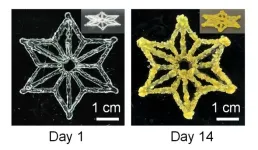(Press-News.org) Bethesda, MD (May 1, 2024) — The American Gastroenterological Association (AGA) has announced the 2024 recipients of its annual recognition prizes, given in honor of outstanding contributions and achievements in gastroenterology.
"AGA is delighted to present the recipients chosen for the 2024 AGA Recognition Prizes. We extend our gratitude to all the nominators for their submission of nomination letters, and to the diligent selection committee members for their work in identifying these exceptional individuals from a pool of highly qualified nominees," expressed John M. Carethers, MD, AGAF, chair of the AGA. "Let us collectively applaud this year's distinguished awardees and honor their significant contributions to the field of gastroenterology, which propel our profession forward.
AGA looks forward to celebrating the recipients during Digestive Disease Week® 2024, May 18-21, in Washington D.C.
Julius Friedenwald Medal
The Julius Friedenwald Medal, presented annually since 1941, recognizes a physician for lifelong contributions to the field of gastroenterology. This year’s Julius Friedenwald Medal, AGA’s highest honor and achievement, is awarded to Bishr Omary, MD, PhD, for his honorable service to the field of gastroenterology and AGA.
Dr. Omary has an exemplary history of leadership and service with AGA. He has served on nine AGA committees and panels since joining AGA in 1994. He served as editor-in-chief of Gastroenterology from 2011-2016. Dr. Omary was crucial in helping AGA secure NIH grants to establish and support the AGA FORWARD program. Most notably, Dr. Omary served as AGA’s 115th president from 2020-2021 and helped lead the organization through the peak of the COVID-19 pandemic. His colleagues describe him as an incredible servant-leader, champion and ambassador for gastroenterology. Dr. Omary currently serves as the senior vice chancellor for academic affairs and research at Rutgers Health (Rutgers University).
William Beaumont Prize
AGA honors Hashem B. El-Serag, MD, MPH, with the William Beaumont Prize in Gastroenterology, which recognizes individuals who have made major contributions that have significantly advanced the care of patients with digestive diseases through clinical or translational research.
Dr. El-Serag is an internationally recognized physician-scientist and clinical epidemiologist in both digestive and liver diseases and has dedicated a large part of his research to hepatocellular carcinoma. In addition to obtaining impressive research funding and publishing over 630 papers (h-index of 152) in the past 25 years, Dr. El-Serag has a remarkable service record at AGA since joining the membership ranks in 1996. He served as AGA’s 114th President from 2019-2020 and guided the organization through the turbulent start of the COVID-19 pandemic. He served as editor-in-chief of Clinical Gastroenterology and Hepatology from 2012-2017. Dr. El-Serag has served as a faculty member at every AGA Academic Skills Workshop hosted since the program’s inception in 2004. In his current role, Dr. El-Serag is the chair of the department of medicine and vice president of the learning health system initiative at Baylor College of Medicine.
Distinguished Achievement Award in Basic Science
AGA recognizes Jerrold R. Turner, MD, PhD, AGAF, with this year’s Distinguished Achievement Award in Basic Science for his major accomplishments and contributions in basic science research, which have played a large role in our understanding of digestive disease.
Dr. Turner has been a leader in epithelial cell biology for more than 25 years. His research has led to critical insights into how the intestinal barrier is maintained in both homeostasis and dysregulated in disease. Dr. Turner is most well-known for his work on myosin light chain kinase (MLCK), where he has driven every major advance, from the initial discovery of MLCK as a key barrier regulator to the development of experimental therapeutic agents. Regarding Dr. Turner’s service to AGA, he founded AGA’s basic and translational science journal, Cellular and Molecular Gastroenterology and Hepatology (CMGH). Dr. Turner currently serves as a professor of pathology and medicine at Harvard Medical School.
Distinguished Service Award in Diversity, Equity and Inclusion
Sophie Balzora, MD, is the recipient of AGA’s Distinguished Service Award in Diversity, Equity and Inclusion. This award honors members who have promoted diversity, equity and inclusion within AGA and the broader gastroenterology community.
Dr. Balzora co-founded and serves as president of the Association of Black Gastroenterologists and Hepatologists, a nonprofit organization which now has over 375 members, with the mission to improve health equity in Black communities and help advance science and develop the careers of Black gastroenterologists, hepatologists and digestive disease scientists. Dr. Balzora is a clinician-educator who is passionate about teaching, mentorship and advocating for DEI within the medical profession and in the delivery of patient care. Dr. Balzora currently serves as a clinical professor of medicine at NYU Grossman School of Medicine.
Distinguished Clinician Awards
The AGA Distinguished Clinician Awards recognize members of the practicing community who, by example, combine the art of medicine with the skills demanded by the scientific body of knowledge in service to their patients.
AGA honors Scott Ketover, MD, AGAF, FASGE, with the Distinguished Clinician Award in Private Practice. Dr. Ketover, president and CEO of MNGI Digestive Health, has made a significant impact on a multitude of aspects of gastroenterology care and practice. He was the first to perform capsule endoscopy in his region and the first in his practice to perform push enteroscopy. Dr. Ketover has championed initiatives to enhance CRC screening rates in his community and oversees the Quality Council Committee at MNGI. His colleagues describe him as a role model not only in clinical practice, but also as a leader and an advocate for patients.
AGA presents the Distinguished Clinician Award in Academic Practice to Shiv Kumar Sarin, MD, chancellor and director as well as senior professor at the Institute of Liver and Biliary Sciences in New Delhi, India. Dr. Sarin established the Institute of Liver and Biliary Sciences, a first of its kind liver university. Dr. Sarin is extremely respected and looked up to by his colleagues with a very impressive and admirable academic career spanning more than three decades. He is a vital academic clinician who introduced several new treatment protocols in the field of hepatology, including the use of band ligation for primary prophylaxis of variceal bleeding.
Distinguished Educator Award
The AGA Distinguished Educator Award honors an individual for achievements as an outstanding educator over a lifelong career. AGA presents the 2024 award to David Katzka, MD, AGAF, for his outstanding achievements and contributions as a clinician, educator and researcher focused on esophageal diseases.
Dr. Katzka has been dedicated to serving AGA and its educational mission for decades. He has served as chair of the CME subcommittee within the AGA Institute Education and Training Committee. He was also the founding head of the AGA Institute Clinical Practice Updates Committee. He served as director of the AGA Postgraduate Course for two years and also had the privilege of serving on the AGA governing board as the education councilor. Dr. Katzka is dedicated to the promotion and mentorship of his fellow clinicians and his nomination for this award was supported by 18 of his colleagues. Dr. Katzka currently serves as professor of medicine and head of the esophageal interest group at Columbia University.
Distinguished Mentor Award
The AGA Distinguished Mentor Award recognizes an individual who has committed lifelong efforts to the mentoring of trainees in the field of gastroenterology and for achievements as an outstanding mentor. AGA honors John Pandolfino, MD, with this year’s award.
Dr. Pandolfino has chartered the course of esophageal motility disorders regarding pathophysiology, diagnosis and treatment over the past two decades. In addition to his clinical contributions and leadership service, Dr. Pandolfino is a world-renowned mentor. He has provided valuable mentorship to fellows and faculty at Northwestern as well as to all those he has collaborated with both nationally and internationally. Dr. Pandolfino has been an advocate not just for his patients with esophageal disease, but for all his fellow colleagues who have dedicated their career to this subfield. Dr. Pandolfino currently serves as the chief of gastroenterology and hepatology at Northwestern University Feinberg School of Medicine.
Young Investigator Awards
The AGA Young Investigator Awards recognize two young investigators, one in basic science and one in clinical science, for outstanding research achievements.
AGA honors Mingyang Song, ScD, with the Young Investigator Award in Clinical Science. Dr. Song is known for his unique expertise in integrating population-based and patient-oriented clinical research and translating these epidemiologic findings into the clinic for cancer prevention. Dr. Song is an abstract reviewer for DDW and authored a Gastroenterology manuscript on gut microbiome in CRC that has become one of the most cited reviews in the journal’s history. Dr. Song’s colleagues describe him as a model young investigator for the GI research community. Dr. Song is currently an associate professor of clinical epidemiology and nutrition at the Harvard T.H. Chan School of Public Health.
AGA honors Kathryn Hamilton, PhD, with the Young Investigator Award in Basic Science. Dr. Hamilton’s research focuses on post-transcriptional gene regulation in the intestinal response to injury and inflammation. In parallel, she is emerging as a nationally recognized investigator in the use of patient-derived organoids for the study of pediatric intestinal diseases. Dr. Hamilton is also devoted to training and mentoring, particularly women and those from underrepresented backgrounds. Dr. Hamilton is currently an assistant professor of pediatrics in the division of gastroenterology, hepatology and nutrition at Children’s Hospital of Philadelphia and University of Pennsylvania Perelman School of Medicine.
# # #
AGA Media Contact: Mara Shapiro, Communications and Media Relations Manager, media@gastro.org, 301-329-5709
About the AGA Institute
The American Gastroenterological Association is the trusted voice of the GI community. Founded in 1897, the AGA has grown to more than 16,000 members from around the globe who are involved in all aspects of the science, practice and advancement of gastroenterology. The AGA Institute administers the practice, research and educational programs of the organization. www.gastro.org
AGA is on Instagram.
Like AGA on Facebook.
Follow us on X @AmerGastroAssn
Check out our videos on YouTube.
Join AGA on LinkedIn.
END
Join us in honoring the 2024 American Gastroenterological Association Recognition Awards recipients
2024-05-01
ELSE PRESS RELEASES FROM THIS DATE:
Resource-appropriate cancer care, including coexisting health issues of HIV and cancer, to be addressed during meeting in Nairobi
2024-05-01
NAIROBI, KENYA [May 1, 2024] — Local and global experts are meeting in Nairobi, Kenya to update clinical practice guidelines as part of ongoing work with Allied Against Cancer—a collaboration between the National Comprehensive Cancer Network® (NCCN®), African Cancer Coalition (ACC), American Cancer Society (ACS), and Clinton Health Access Initiative (CHAI). The meeting brings together subject matter experts to update NCCN Harmonized Guidelines™ for Sub-Saharan Africa, featuring updates for treating cancer in people with HIV and other important ...
Marriage of synthetic biology and 3D printing produces programmable living materials
2024-05-01
Scientists are harnessing cells to make new types of materials that can grow, repair themselves and even respond to their environment. These solid “engineered living materials” are made by embedding cells in an inanimate matrix that’s formed in a desired shape. Now, researchers report in ACS Central Science that they have 3D printed a bioink containing plant cells that were then genetically modified, producing programmable materials. Applications could someday include biomanufacturing and sustainable construction.
Recently, researchers have been developing engineered living materials, primarily relying on bacterial ...
Friends with health benefits: How the buddy system pays off when pursuing goals
2024-05-01
Weekly targets, annual resolutions, five-year plans—all of them so troublingly elusive. With best intentions, most of us fail to stick with the goals we set.
Next time, consider pursuing them with a friend.
New field research by Assistant Professor Rachel Gershon, published in Management Science, suggests that pursuing our goals with friends may make them more attainable. Gershon, along with Cynthia Cryder of Washington University and Katy Milkman of the University of Pennsylvania, ...
Novel genetic plant regeneration approach without the application of phytohormones
2024-05-01
For ages now, plants have been the primary source of nutrition for animals and mankind. Additionally, plants are used for the extraction of various medicinal and therapeutic compounds. However, their indiscriminate use, along with the rising demand for food, underscores the need for novel plant breeding practices. Advances in plant biotechnology can address the problems associated with food scarcity in the future by enabling the production of genetically modified (GM) plants with higher productivity and resilience to the changing climate.
Naturally, plants can regenerate an entire new plant from a single ‘totipotent’ cell (a cell that ...
ACS inaugural report shows mortality for preventable cancers among native Hawaiian and other Pacific Islanders in U.S. is 2-3 times as high as white people
2024-05-01
ATLANTA, May 1, 2024 — The American Cancer Society (ACS) today released a first-of-its-kind Cancer Facts & Figures for Asian American, Native Hawaiian, & Other Pacific Islander People, 2024-2026. This report shows that despite limited disaggregated data, there is wide variation in the cancer burden among ethnic groups that make up this fast-growing population. Cancer is the second-leading cause of death in the United States nationally but ranks first in Chinese, Filipino, Korean, and Vietnamese individuals, with lung cancer the leading cause of death in men of every Asian American, Native ...
ChatGPT fails at heart risk assessment
2024-05-01
SPOKANE, Wash. – Despite ChatGPT’s reported ability to pass medical exams, new research indicates it would be unwise to rely on it for some health assessments, such as whether a patient with chest pain needs to be hospitalized.
In a study involving thousands of simulated cases of patients with chest pain, ChatGPT provided inconsistent conclusions, returning different heart risk assessment levels for the exact same patient data. The generative AI system also failed to match the traditional ...
Improved AI process could better predict water supplies
2024-05-01
PULLMAN, Wash. -- A new computer model uses a better artificial intelligence process to measure snow and water availability more accurately across vast distances in the West, information that could someday be used to better predict water availability for farmers and others.
Publishing in the Proceedings of the AAAI Conference on Artificial Intelligence, the interdisciplinary group of Washington State University researchers predict water availability from areas in the West where snow amounts aren’t being physically measured.
Comparing ...
A blood test for stroke risk? Study finds network of inflammatory molecules may act as biomarker for risk of future cerebrovascular disease
2024-05-01
A simple blood test could allow doctors to determine whether a person may be at higher risk for stroke or cognitive decline during their lifetime, according to a new UCLA Health study.
The study, published in the journal Stroke, found that measuring concentrations of a network of inflammatory molecules in the blood could allow doctors to calculate a risk score for susceptibility for cerebral small vessel disease – a common cause of stroke and a contributor to cognitive decline found especially among the elderly.
Currently, the only way to determine a person’s risk for cerebral vascular diseases has been ...
New survey finds 75% of Americans feel mental health takes back seat to physical health within U.S. healthcare system
2024-05-01
WASHINGTON, DC – May 1, 2024 – Three-quarters of Americans feel mental health conditions are identified and treated much worse than physical health issues within the U.S. healthcare system, even as more than 80% perceive a dramatic rise in prevalence of mental health issues in the last five years, according to a new survey from West Health and Gallup released at the start of Mental Health Awareness Month and Older Americans Month.
Nearly identical percentages believe mental health is handled either “much” (38%) or “somewhat” worse (37%) than physical health ailments, while 15% say they are dealt with “about the same.” ...
Brief anger may impair blood vessel function
2024-05-01
Research Highlights:
When adults became angry after remembering past experiences, the function of cells lining the blood vessels was negatively impaired, which may restrict blood flow. Previous research has found that this may increase the risk of heart disease and stroke.
In this study, episodes of anxiety and sadness did not trigger the same change in functioning of the blood vessel lining.
Embargoed until 4 a.m. CT/5 a.m. ET Wed., May 1, 2024
DALLAS, May 1, 2024 — A brief episode of anger triggered by remembering past experiences may negatively impact the blood vessels’ ability to relax, which is essential ...




